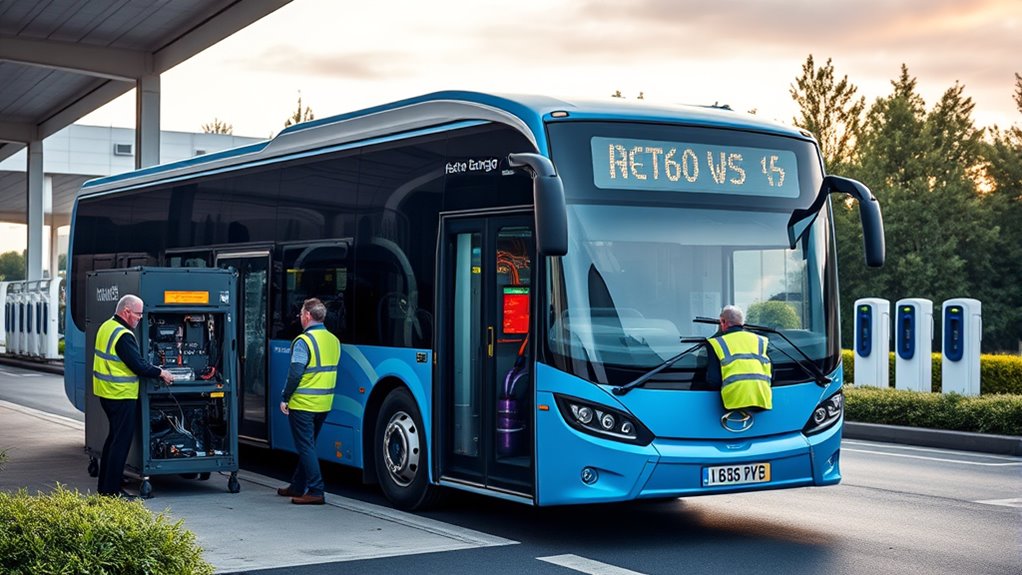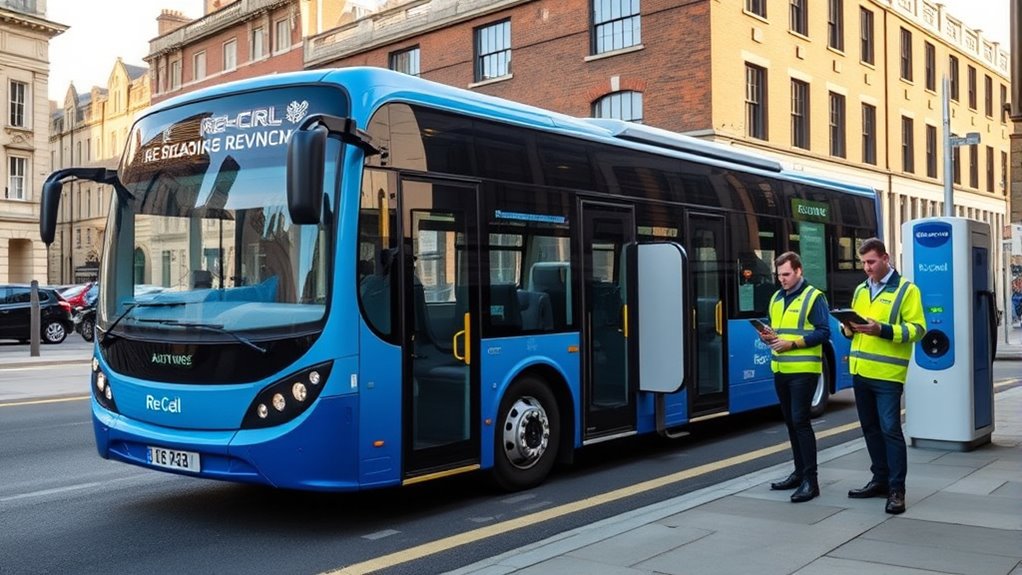Implementing Bus ESS Re-Cell Service helps you extend battery life in UK fleets by restoring capacity through reconditioning, reducing the need for costly replacements, and optimizing performance. It enables proactive monitoring, early fault detection, and quick repairs, preventing unexpected failures and downtime. Recycling and refurbishing batteries also support sustainability and cost savings. Focusing on these strategies aligns your fleet with environmental goals while boosting efficiency—discover how these innovations can transform your operations.
Key Takeaways
- Re-Cell service refurbishes and reconditions batteries, restoring capacity and delaying costly replacements in UK bus fleets.
- It offers real-time diagnostics and proactive maintenance to prevent unexpected battery failures.
- Extending battery lifespan reduces waste and supports UK’s sustainability and circular economy initiatives.
- Quick battery swaps with reconditioned units minimize fleet downtime and improve operational efficiency.
- Implementing Re-Cell enhances long-term cost savings and aligns with eco-friendly transportation goals.

Ever wondered how bus fleets are becoming more sustainable and cost-effective? The answer lies in innovative solutions like the Bus ESS Re-Cell Service, which focuses on extending battery life and optimizing fleet management. As electric buses become more prevalent across the UK, managing their batteries efficiently is essential to reducing operational costs and environmental impact. One of the key aspects of this management is battery recycling, a process that not only promotes sustainability but also allows you to recover valuable materials from used batteries. When batteries reach the end of their usable life, instead of simply discarding them, you can recycle components like lithium, cobalt, and nickel, turning waste into a resource. This approach cuts down on the environmental footprint of your fleet and supports circular economy principles.
Extending battery life and recycling materials to boost sustainability and reduce costs in UK electric bus fleets
The Re-Cell Service plays a critical role in this cycle by refurbishing and reusing batteries that would otherwise be considered waste. Instead of replacing entire battery packs, you can opt for reconditioning them through specialized processes that restore their capacity and performance. This not only saves money but also reduces the demand for raw materials, which are often scarce and expensive. By integrating battery recycling into your fleet management strategy, you extend the lifespan of each battery, ensuring your electric buses stay on the road longer without sacrificing reliability or safety. It also minimizes downtime, as reconditioned batteries can be swiftly swapped in and out, keeping your service running smoothly.
Moreover, the Re-Cell Service helps you monitor battery health more accurately, enabling proactive maintenance rather than reactive repairs. This approach prevents unexpected failures and optimizes the overall performance of your fleet. With real-time data and advanced diagnostics, you can identify batteries that need reconditioning early, plan replacements efficiently, and avoid costly emergency repairs. This forward-thinking stance not only conserves resources but also enhances your operational efficiency. As fleet management becomes more data-driven, incorporating battery recycling and re-cell services becomes essential for keeping costs predictable and performance high.
Additionally, understanding the importance of proper battery management is crucial for maximizing the longevity and efficiency of electric vehicle batteries.
In the long run, adopting these practices aligns with your sustainability goals while delivering tangible financial benefits. By reducing waste through battery recycling and prolonging battery life with re-cell services, you’re making a conscious choice to support greener transportation solutions. The UK’s push towards electric mobility is accelerating, and embracing innovative battery management strategies like the Bus ESS Re-Cell Service positions your fleet at the forefront of this transition. It’s a smart move that balances environmental responsibility with economic efficiency, ensuring your bus operation remains competitive and sustainable well into the future.
Frequently Asked Questions
How Much Does the Re-Cell Service Cost per Bus Battery?
You’ll find that the re-cell service costs around £200-£300 per battery, depending on size and condition. When you compare costs, consider the benefits of battery recycling and extended lifespan, which can reduce overall expenses. A proper cost comparison shows that investing in re-cell services can save money in the long run by delaying new battery purchases and promoting sustainability within your fleet.
What Is the Typical Turnaround Time for Re-Cell Services?
Think of re-cell services as a well-timed pit stop in a race; they usually take about one to two weeks, depending on your fleet’s needs. You’ll want to plan your service scheduling carefully, just like scheduling battery recycling to guarantee minimal downtime. This swift turnaround keeps your batteries in top shape, extending their life and maintaining your fleet’s efficiency without long delays.
Are There Warranty Options Available for Re-Processed Batteries?
Yes, warranty options are available for re-processed batteries. These warranties typically cover battery performance issues and guarantee you’re protected if the battery’s performance declines prematurely. When choosing a re-cell service, you can expect warranty coverage that offers peace of mind, helping you maintain peak battery performance and extend your fleet’s operational life. Always check the specific warranty terms to understand what’s included and how long coverage lasts.
Can Re-Cell Services Be Integrated With Existing Fleet Management Systems?
Yes, re-cell services can be integrated with your existing fleet management systems. You can incorporate fleet data integration to monitor battery performance and health in real-time. This allows you to optimize maintenance scheduling, ensuring timely interventions and extending battery life. By connecting re-cell services seamlessly, you improve operational efficiency, reduce downtime, and maximize the lifespan of your batteries, all while maintaining smooth fleet operations.
How Do Re-Cell Services Impact Overall Fleet Operational Downtime?
Re-cell services act like a pit stop for your fleet, minimizing downtime by boosting battery performance and ensuring service reliability. They streamline maintenance, reducing unexpected breakdowns that can throw your schedule off course. With efficient re-celling, you keep your buses running smoothly, so your operations stay on track without costly delays. This proactive approach keeps your fleet’s rhythm steady, saving you time and keeping passengers happy.
Conclusion
By choosing our Bus ESS Re-Cell Service, you’re not just extending battery life—you’re reducing waste and supporting a greener future. Imagine the impact of every mile traveled on a cleaner planet, yet also the cost savings on maintenance and replacements. It’s a powerful reminder that sustainability and efficiency go hand in hand. Together, you can drive change, blending innovation with responsibility, and prove that every journey can make a difference.









